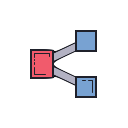Overview:
TheConditional Execution block allows for the evaluation of specific conditions to determine the flow of execution. This block effectively directs operations based on whether the specified condition is fulfilled, providing flexibility in processing data dynamically.
Inputs & Outputs
| I/O | Feature | Type | Simple Explanation |
|---|---|---|---|
| input | condition_type | selector | Defines which type of condition is applied for filtering. |
| input | condition | string | The specific condition required to trigger a particular action. |
| input | value | any | The data that needs to be evaluated against the condition. |
| input | condition_value | string | The standard or benchmark used for comparison with the value. |
| output | if_true | any | Returns this value if the conditions are met successfully. |
| output | else | any | Returns this value if the conditions are not met. |
When a provided condition evaluates to true, only the subflow connected to
if_true will be executed. Conversely, if it evaluates to false, only the
subflow connected to else will proceed.Use Cases
Consider how this block can enhance operational efficiency in various situations:- Conditional Workflow Management: When developing workflows that require different actions based on user inputs or environmental factors, this block allows seamless transitions between those paths.
- Dynamic Content Generation: In scenarios like personalized marketing offers, depending on whether a user meets certain criteria (like age or spending habits), different offers can be generated automatically.
- Automated Alerting System: For monitoring applications, conditional execution enables real-time alerts when specific thresholds are crossed—such as notifying support teams when system errors occur.
Conditional Execution block proves invaluable!